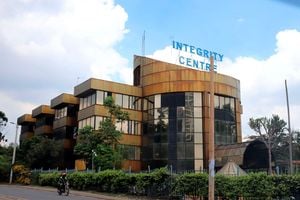Breaking News: Former Lugari MP Cyrus Jirongo dies in a road crash

A Senate watchdog committee on Tuesday heard how the Homa Bay County government dished out loans of over Sh50 million to senior officers without asking for security or providing the repayment timelines or interest due.
The revelation was made during the Senate County Public Investments and Special Funds Committee meeting on Monday. The committee is currently considering three funds that were operated by the county government between 2019 and 2022.
The committee chaired by Vihiga Senator Godfrey Osotsi was told that the administration of former Governor Cyprian Awiti borrowed money from the Car Loan and Mortgage Fund before advancing it to senior officers including county executive committee members and chief officers without regard to the law.

Former Homa Bay County Governor Cyprian Awiti at a past function.
In the financial year ending June 2020 for instance, the county government borrowed Sh24 million from the fund and issued unsecured loans to top officials.
No documents were provided to support the transactions, including confirmation of the balance by the beneficiaries, terms of the loans, interest receivable and when they would fall due.
The county’s regulations state that borrowings from the Fund by any unit of the county government must be approved by the loans committee and the terms and purpose of borrowing must be clearly set out in the lending agreement.
Auditor-General Nancy Gathungu revealed that the fund did not have in its custody the title deeds and logbooks that were to be used as collateral to secure loans advanced to 26 officers. Further, documents such as insurance certificates, purchase invoices or sale agreements and the amortisation schedules were not provided for audit.
Vehicles bought with the cash were registered only in the names of the loanees and not jointly with the county.
This, the report said, is a contravention of the regulation 9(2) of the Public Finance Management (County Executive Car Loan (Members) Scheme Fund) Regulations, 2014.
The regulation requires that such logbooks shall be kept in the custody of the officer administering the fund until the loan is repaid in full.
Records also revealed that management did not have a charge registered on financed properties. The law requires the mortgage institution to charge security on the properties acquired through loans from the fund.
Further, Ms Gathungu questioned how the county government will be able to recover outstanding loans of Sh27 million advanced to 13 ex-employees whose contracts were terminated in March 2019 when they had not repaid their loans.
“All these borrowings must be accounted for. We will have a close look at the queries in the subsequent audits to ensure there is no loss of public funds,” said Mr Osotsi.
Appearing before the committee, Governor Gladys Wanga admitted that there is no evidence that the borrowed money was actually refunded. She said her administration is currently rebuilding the fund and has pumped in Sh94 million.
“We only have the minutes of the car loan and mortgage committee that stipulated the executive was to borrow but did not stipulate timelines for refund. We have now given the fund to a financial institution to run it,” said Ms Wanga.
The governor added that the previous administration did not observe mortgage rules while issuing such facilities, leaving the county with a debt.
However, she said, the county has moved to ensure recovery by issuing demand letters to staff, former and current, who are in arrears.
“We want to file recovery proceedings against the defaulters as a long-term strategy as there is no security we are holding. It is the only option we have since we cannot allow the query to hang over us for long,” she said.











